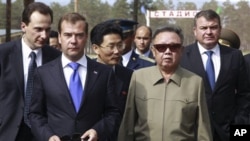Two survivors of North Korean prison camps testified before a U.S. congressional panel about the abuse they and their families endured for decades. The two women defectors say they speak for for as many as 200,000 prisoners being held in forced labor camps in North Korea.
The chairman of the House of Representatives Foreign Affairs Subcommittee on Africa, Global Health and Human Rights, Republican Chris Smith, welcomed two women who had come to shed light on the fate of political prisoners in North Korea.
"Mrs. Kim Young Soon and Mrs. Kim Hye Sook, who both have survived the extreme deprivations of the North Korean prison camps, have traveled all the way from South Korea to share their experiences with our subcommittee," said Smith.
Smith said the two survivors' testimony is especially valuable because North Korea is so closed to the outside world that it often evades scrutiny.
Kim Hye Sook told the panel how North Korean security forces came to her home in 1975 when she was 13-years-old, and dragged her and her family to a prison camp, where she spent the next 28 years.
"I cannot even begin to describe how many people suffered and died because of starvation in the prison camp, and how many people were killed without reason for not listening to authorities or not showing enough repentance through public execution by firing squad," she said.
Kim Hye Sook said one of the rules of the camp was that inmates were not allowed to know why they are imprisoned. She said all of the adults were forced to work in coal mines from sunup to sundown, and were responsible for preparing their own food, often only a gruel made from grass or tree bark. She said she was plagued with hunger from the day she arrived at the camp, and longed to eat a bowl of white rice. She contracted black lung disease in the coal mines, and lost her husband and brother in the camp. When she was released and went to China, she said, she was a victim of human and sexual trafficking, and was sold several times. She now lives in South Korea.
The other witness, Kim Young Soon, also delivered an emotional and moving testimony of her years in a prison camp.
"In conclusion, I would just like to say that in the political prison camps in North Korea, it is a place where the prisoners will eat anything that flies, crawls or grows in the fields," she said.
Kim Young Soon was a young dancer when she says she was taken to the prison camp for knowing about one of North Korean leader Kim Jong Il's mistresses. From her original family of eight people, only two survived, including herself. Kim Young Soon now lives in South Korea and is Vice President of the Committee for the Democratization of North Korea.
Another witness at the hearing was Suzanne Scholte of the Defense Forum Foundation. She said former U.S. Presidents Bill Clinton and George W. Bush made the mistake of focusing on North Korea's nuclear weapons program and not enough on the human rights in the communist country. She called on President Barack Obama to speak out on Pyongyang's human rights abuses.
"I think we should say, 'We want to give North Korea as much aid as they need, so that the people are not starving, but we want to be able to see that it is consumed.' I think we should be talking about the fact that we want to help the people, we want to improve conditions there. We would like to see the International Red Cross be able to go to the political prison camps," said Scholte.
Scholte said North Korea's leaders have been very effective in manipulating the Six Party Talks on their country's nuclear program. She called on the United States and other countries to reach out directly to the North Korean people through radio broadcasts and to speak openly about the human rights violations and prison camps in the country.
North Korean Prison Camp Survivors Testify Before US Congressional Panel
- By Cindy Saine




